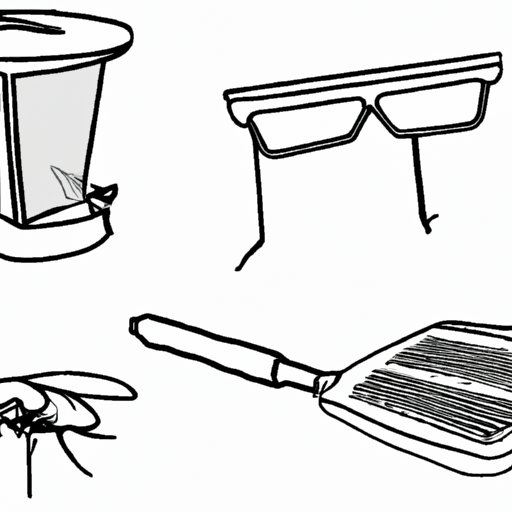
I. Introduction
Flies are one of the most common household pests that can pose a threat to human health. They carry diseases, trigger allergies, and contaminate food. It is important to find effective ways to catch flies to maintain a healthy living environment.
II. Using a Fly Swatter
A fly swatter is an affordable and straightforward tool used to catch flies. It works by hitting the fly mid-air, typically killing them on impact. It’s best to use a fly swatter in small spaces or when there are only a few flies in the area.
When using a fly swatter, it’s important to make sure that the fly is within range before striking. Swatting too far away from the fly can miss and cause damage to surrounding objects. Swatting too hard can also lead to a mess if the fly is smashed.
III. Homemade Traps
Homemade traps are an inexpensive and efficient way to catch flies. A simple trap can be made using sugar syrup, vinegar, and paper. Flies are attracted to the smell of the sugar syrup or vinegar and become stuck to the paper.
To make a homemade trap, mix equal parts of sugar syrup or vinegar with water and pour it into a container. Cover the top with paper and poke small holes in the paper. Place the container in an area where flies gather, and they will be attracted to it.
IV. Chemical Sprays
A chemical spray is an effective way to kill flies quickly. There are various types of chemical sprays available in the market, such as insecticides or natural solutions. Chemical sprays work by either suffocating or poisoning the flies.
However, when using chemical sprays, it’s important to handle them with caution and follow instructions carefully. Chemical spray can be harmful to humans and pets if inhaled or ingested. Avoid spraying the chemicals directly onto surfaces that come in contact with food.
V. Sticky Traps
Sticky traps are a simple and mess-free way to catch flies. They work by trapping the fly on a sticky surface, making it unable to fly away. Sticky traps come in various shapes and sizes, suitable for different applications.
To use a sticky trap, remove the cover and stick it on a surface where the flies tend to gather, such as the window. The flies will be attracted to the bright colors and stick to the surface. Dispose of the sticky trap once it’s full of flies.
VI. Vacuum
A vacuum cleaner can be a useful tool to catch flies, especially when the fly is in an unreachable location. It works by sucking the fly into the vacuum’s bag or canister, trapping it inside.
When using a vacuum cleaner to catch flies, make sure to use a hose attachment to control the suction power. Avoid using a high-powered vacuum, as it may cause damage to the object or surface the fly is on. Empty the vacuum bag or canister after each use to prevent further infestation.
VII. Electric Fly Zapper
An electric fly zapper is a modern way to catch flies. It works by attracting flies to the device using ultraviolet light and electrocuting them on contact. Electric fly zappers are efficient, hygienic, and safe for indoor use.
When purchasing an electric fly zapper, consider the size of the area where it will be used. Larger areas require a bigger device. It’s also important to keep the device away from children and pets and to regularly clean the collection tray to prevent a build-up of dead flies.
VIII. Trained Animals
Trained animals, such as spiders or geckos, can be used as a natural way to catch flies. These animals hunt flies for food and can help reduce the number of flies in the area.
However, trained animals are not practical for all situations. Spiders or geckos in the house can cause fear or discomfort to some people, and they may not always be present when needed. Additionally, it is essential to ensure that the trained animal is not poisonous or harmful to humans and pets.
IX. Conclusion
There are various methods to catch flies, each with its benefits and drawbacks. It’s important to choose a method that suits individual situations and preferences. A combination of methods may be necessary for severe infestations.
By catching flies effectively, we can maintain a clean and healthy living environment and prevent the spread of diseases.




